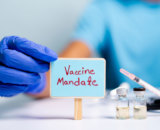The House of Representatives late Friday night approved 219-212 a budget reconciliation bill reflecting President Biden's $1.9 trillion COVID relief plan, sending the bill to the Senate for consideration. The legislation would provide direct payments, a child tax credit expansion in the form of direct payments, extended unemployment benefits, COBRA subsidies and ACA tax credit enhancements, state & local funding, among other provisions. Two Democrats voted against the bill (Reps. Golden D-ME and Schrader D-OR) and no Republicans voted in favor.
The House bill includes a minimum wage increase to $15 per hour, but the Senate parliamentarian's ruling late last week that the provision violates budget reconciliation rules means it is likely to be stripped out by the Senate. The Washington Post reported last night that senior Democrats are abandoning a backup plan to increase the minimum age through a corporate tax penalty, after encountering numerous practical and political challenges in drafting their proposal over the weekend. Democrats have said they will seek to include the $15 minimum wage proposal in a separate legislative package to be advanced later in Biden's Administration.
If the House bill is changed by the Senate, a conference process to resolve differences may be necessary or, at the very least, another House vote on the final version will be required before the President's signature. Democrats want the bill enacted before the pandemic unemployment insurance programs expire March 14. The final package will likely look quite similar to the House bill.
Some provisions of the House bill most pertinent to travel center operators are described below.
Tax
- Extension of the employee retention tax credit through Dec. 31, 2021, and, beginning after June 30, 2021, structuring it as a refundable payroll tax credit.
- $1,400 advance payments that phase out between $75,000-$100,000 adjusted gross income ($150k-$200k for joint filers).
- A refundable and advanceable child tax credit expansion to $3,000 per child ($3,600 under 6) that will take the form of IRS payments.
- An increase in the amount of child and dependent care expenses that are eligible for the credit to $8,000 for one qualifying individual and $16,000 for two or more qualifying individuals (such that the maximum credits are $4,000 and $8,000).
- An extension of the supplemental federal unemployment insurance program past mid-March through August 21, with the supplemental amount increased from $300/week to $400/week between March 14 and August 29.
ACA Tax Credits and COBRA Coverage
- Expands the Affordable Care Act's (ACA's) premium tax credits for health insurance purchased through an exchange for 2021 and 2022.
- Eliminates premiums for individuals at 150% of the federal poverty level (FPL) or less, and reduces premiums for all other households.
- Make households above 400% of the FPL newly eligible for premium tax credits, with a premium cap of 8.5% of income.
- Allow tax payers who receive unemployment compensation in 2021 to be eligible for the credit without any premiums.
- Subsidizes 85% of premiums for individuals eligible for COBRA continuation coverage, available through Sept. 30.
- Would not be available once an individual becomes eligible for coverage under another group health plan or Medicare.
- The employee would pay 15% of the premium an the employer or health plan could claim a refundable tax credit against its Medicare payroll tax liability for paying the remaining amount.
Paycheck Protection Program
- The bill increases the PPP's lending authority by $7.25 billion, to $813.7 billion, and appropriates the same amount for the Small Business Administration (SBA) to guarantee additional loans. The bill would expand PPP loan forgiveness to include payments made for premiums on behalf of individuals who qualify for COBRA continuation coverage.
Restaurant Assistance
- $25 billion for a Restaurant Revitalization Fund administered by the SBA. Eligible recipients include restaurants, bars, food trucks, and caterers. For 60 days after enactment, $5 billion would be set aside for eligible entities that had gross revenue of $500,000 or less in 2019. Neither publicly traded companies nor entities with more than 20 locations are not eligible for assistance under this program, regardless of whether those locations do business under the same name or multiple names.
- A lot of the details pertaining to this program are unclear and will be clarified by SBA. As a general matter, it is likely that a restaurant within a travel center will only be eligible for assistance under this program if it is organized as a separate business entity from the underlying travel center. NATSO will be providing additional information on this program in the days and weeks ahead.
Disaster Loans
- $15 billion for additional Economic Injury Disaster Loan (EIDL) advance payments, with applications processed by the SBA on a staggered schedule. Within 14 days of enactment, businesses with 300 or fewer employees and losses of at least 30% over eight weeks compared with a similar period before the pandemic would be eligible for applications to be processed.
SNAP
- More than $1.1 billion in additional funding for the Supplemental Nutrition Assistance Program. An additional $25 million to make technological improvements to improve online purchasing in the SNAP program and to educate retailers on the process and technical requirements for the online acceptance of SNAP benefits, including mobile payments.
Subscribe to Updates
NATSO provides a breadth of information created to strengthen travel plazas’ ability to meet the needs of the travelling public in an age of disruption. This includes knowledge filled blog posts, articles and publications. If you would like to receive a digest of blog post and articles directly in your inbox, please provide your name, email and the frequency of the updates you want to receive the email digest.
